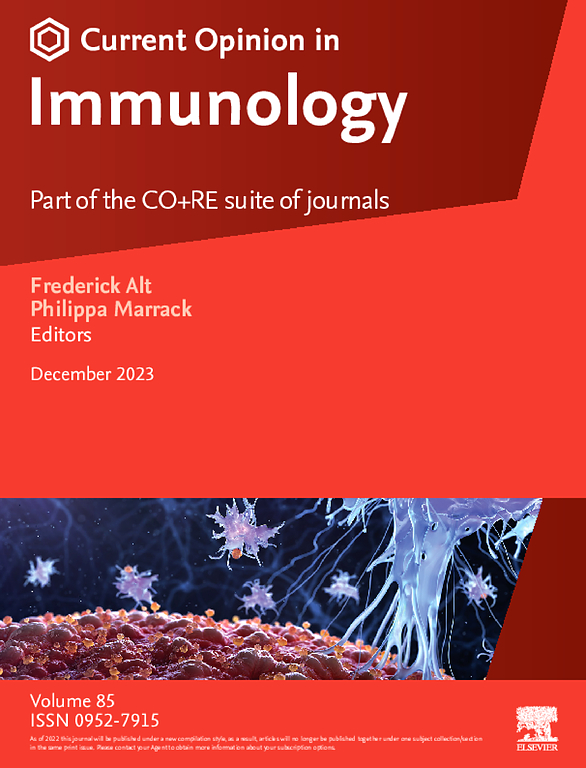我们能治愈抗磷脂综合征吗?
IF 5.8
2区 医学
Q1 IMMUNOLOGY
引用次数: 0
摘要
抗磷脂抗体综合征(APS)是由针对pl结合蛋白(aPL)的自身抗体介导的复发性血栓形成和/或流产的血管病变,主要是β2糖蛋白I (β2GPI)。虽然凝血是血管APS的关键,但血栓形成不是胎盘病理的关键。尽管如此,抗凝血/抗血小板药物是主要的治疗方法,但这不是一种“一刀切”的治疗方法,并且有复发的报道。补充治疗(例如抗疟药、他汀类药物)和更好地描述个人风险状况可能会改善结果。然而,我们仍然无法“治愈”APS。理想的目标是抑制aPL。然而,免疫抑制甚至b细胞疗法都没有效果。由于β2GPI作为APS自身抗原的鉴定,靶向CD38抗体产生细胞或抗cd19 CAR-T细胞疗法以及嵌合自身抗原受体T细胞疗法都是有希望的替代方案。旨在改善凝块溶解或影响β2GPI/抗β2GPI组织复合物形成的进一步治疗具有吸引人的临床前前景。本文章由计算机程序翻译,如有差异,请以英文原文为准。
Can we cure antiphospholipid syndrome?
Antiphospholipid antibody syndrome (APS) is a vasculopathy with recurrent thrombosis and/or miscarriages mediated by autoantibodies against PL-binding proteins (aPL), mainly beta2glycoprotein I (β2GPI). While clotting is the key in vascular APS, thrombosis is not critical for placenta pathology. Despite that, anticoagulant/antiplatelet drugs are the leading treatments, but this is not a ‘one-size-fits-all’ therapy, and recurrences are reported. Additional therapies (e.g. antimalarials, statins) and a better characterization of the individual risk profile may improve the outcome. Nevertheless, we are still unable to ‘cure’ APS. The ideal target would be aPL suppression. However, immunosuppression or even B-cell therapies are not effective. Targeting CD38 on antibody-producing cells or anti-CD19 CAR-T cell therapy are promising alternatives, as well as the chimeric autoantigen receptor T cell therapy, due to the identification of β2GPI as an APS autoantigen. Further therapies aimed at improving clot lysis or affecting β2GPI/anti-β2GPI tissue complex formation are appealing preclinical perspectives.
求助全文
通过发布文献求助,成功后即可免费获取论文全文。
去求助
来源期刊
CiteScore
13.30
自引率
1.40%
发文量
94
审稿时长
67 days
期刊介绍:
Current Opinion in Immunology aims to stimulate scientifically grounded, interdisciplinary, multi-scale debate and exchange of ideas. It contains polished, concise and timely reviews and opinions, with particular emphasis on those articles published in the past two years. In addition to describing recent trends, the authors are encouraged to give their subjective opinion of the topics discussed.
In Current Opinion in Immunology we help the reader by providing in a systematic manner: 1. The views of experts on current advances in their field in a clear and readable form. 2. Evaluations of the most interesting papers, annotated by experts, from the great wealth of original publications.
Current Opinion in Immunology will serve as an invaluable source of information for researchers, lecturers, teachers, professionals, policy makers and students.
Current Opinion in Immunology builds on Elsevier''s reputation for excellence in scientific publishing and long-standing commitment to communicating reproducible biomedical research targeted at improving human health. It is a companion to the new Gold Open Access journal Current Research in Immunology and is part of the Current Opinion and Research(CO+RE) suite of journals. All CO+RE journals leverage the Current Opinion legacy-of editorial excellence, high-impact, and global reach-to ensure they are a widely read resource that is integral to scientists'' workflow.

 求助内容:
求助内容: 应助结果提醒方式:
应助结果提醒方式:


